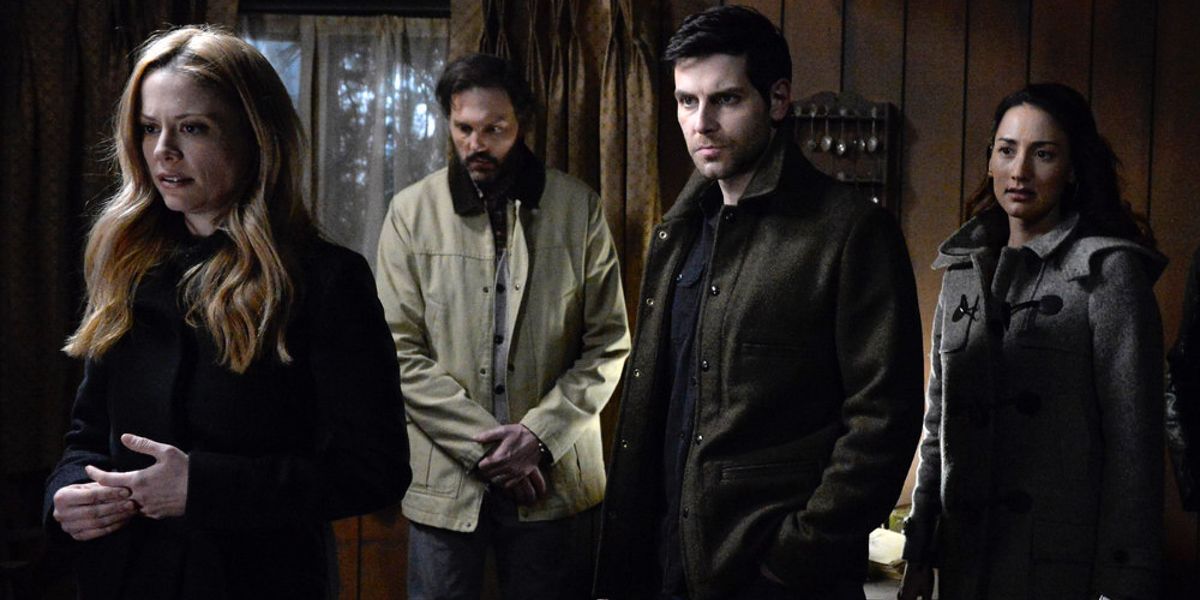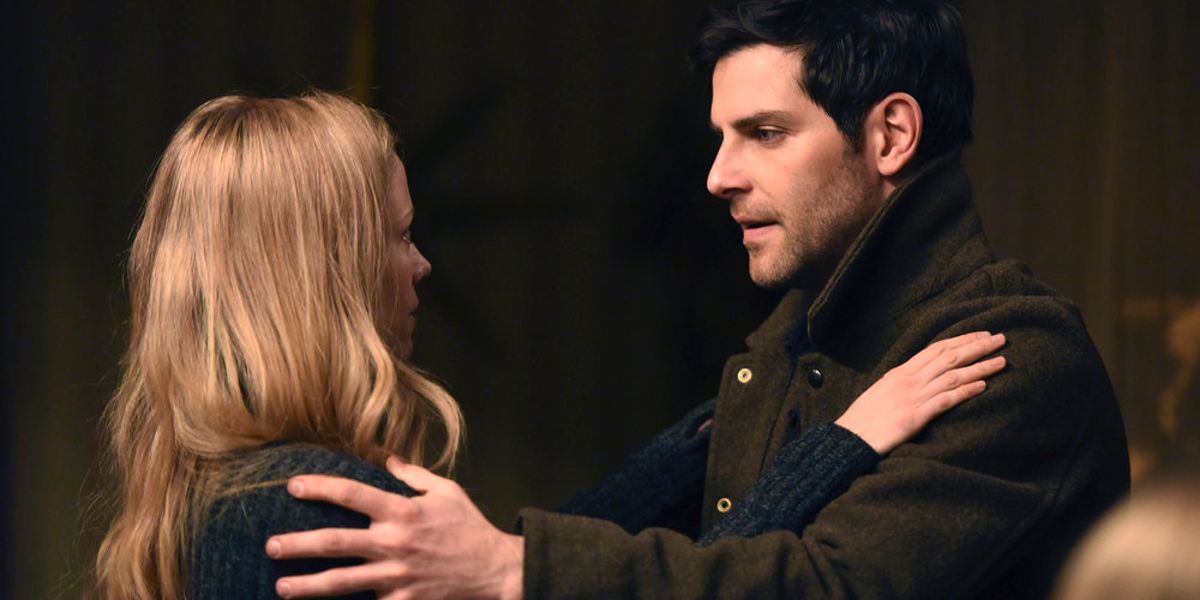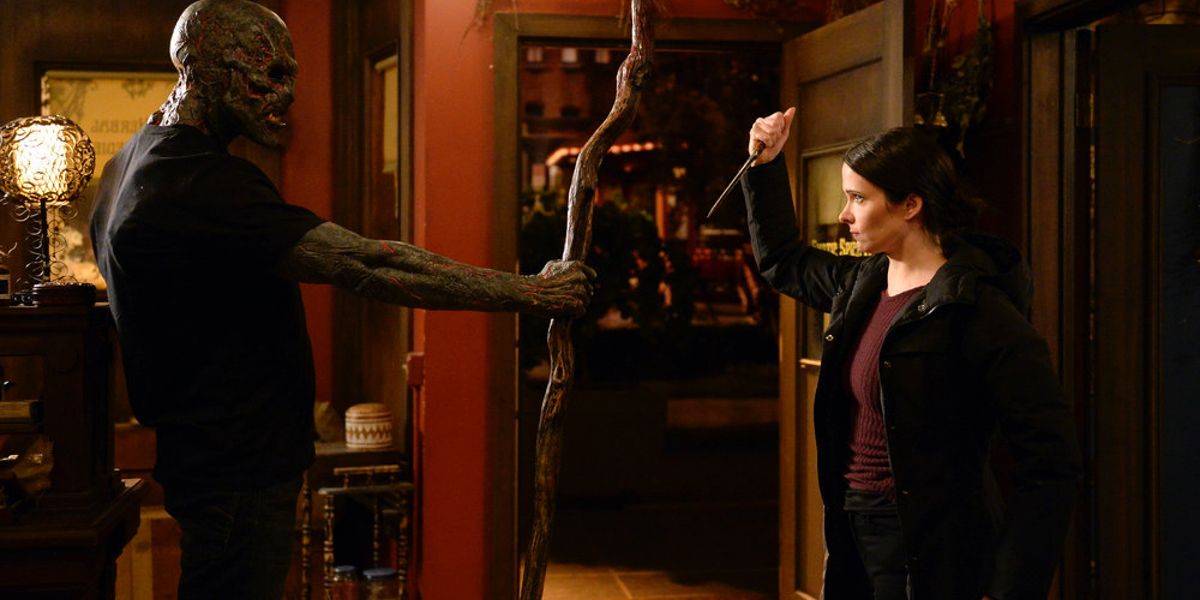After six seasons of hunting down storybook monsters and building its own increasingly complex mythology, NBC's horror/fantasy procedural Grimm finally turns to the page that reads The End. A Friday night mainstay for the past few years, the series proved itself to be a reliable ratings grab for the peacock network, surviving before and long after shows like Hannibal came and went. Though it never quite managed to grab a huge audience or to become a regular talking point from week to week, the series did the next best thing: it developed a passionate fan base.
When you stop to consider the series' fantasy/occult leanings and its storyline detailing a secret world filled with monsters and the group destined to hunt them, it's not surprising that the series neither completely took the world by storm nor that it attracted a community of devoted viewers. But whereas a series like Grimm was always intended to be open ended, the show demonstrated a surprising aptitude for change, bringing star David Giuntoli's Nick Burkhardt and his ever-expanding group of supporting characters closer by altering the dynamic of the series from being another rote "chosen one" drama to more of a true ensemble that, in many ways, began to resemble the show itself: a tiny enclave of misfits devoted to one another and a singular cause.
That cause is, of course, killing monsters, something the show did quite well with its weirdly awful yet endearing brand of special effects that transformed seemingly regular folks into Wesen – mythological creatures who are either horrific killers or misunderstood beasts just trying to make it in a world that either doesn't know they exist or has created Grimms who are dedicated to wiping them out. If that sounds familiar, it's because it is. But even though Grimm rode in on some Supernatural coattails doesn't mean the series didn't have an identity all its own. Over time, that identity proved unique and charming enough that when the series was granted a sixth and final season, it was worth wondering how, exactly, the show would wrap things up.
As with most shows dealing with the supernatural or that have a heavy fantastical element to them, Grimm was able to play a fast and loose with its characters and their lives leading up to the series finale, appropriately titled 'The End.' Last week's penultimate hour brought the season's skull-faced big bad Zerstörer into the real world and gave him a human body played by Jessica Jones and Arrow actor Wil Traval (which also meant giving him a form-fitting black t-shirt and an equally snug pair of jeans, leading to the strangely hilarious sight of a staff-toting, skull-faced monster with glowing green eyes dressed like he's about to go clubbing with his bros). It also meant the end of longtime characters Hank (Russell Hornsby) and Wu (Reggie Lee), who, like everyone else in the Portland PD were killed when Zerstörer arrived looking for, of all things, a magic stick, and wound up killing everyone but Nick.
As far as penultimate episodes go, the very violent deaths of two major characters leading up to a series finale is definitely reason to check in and see whether the show can make sense of it all. Normally, killing off characters before the endgame feels like a disservice to the actor in question. After all, Hornsby and Lee have been around since the beginning, and likely deserve to play a part in how Grimm comes to a close, right? Well, as it turns out, killing the two characters off actually gives the finale more weight, and it clears two admittedly important pieces off the board, making Nick's battle against Zerstörer more streamlined – especially once the baddie begins killing everyone off.
It's not all that surprising that Grimm would settle into slasher mode for its finale. The series has always had an undercurrent of horror in its narrative, and its love of things that go bump in the night means it can easily lend itself to a finale that, in some ways, feels as though Nick and his motely crew of friendly Wesen and other monsters – including Diana, a young girl intended to be Zerstörer's bride – have decided to take an ill-timed vacation at Camp Crystal Lake. While it doesn't go quite that far, the finale still leans into horror tropes by returning to a cabin in the woods. This time, though, it's the cabin first seen in the series premiere. It's clear the intention is to lend the series a sense of symmetry by bringing things full circle to a familiar location, and there is a strangely pleasant sense of nostalgia in seeing everyone gathered together in one place, ready to fight a singular evil. That is until the setting turns into a kill floor.
Grimm essentially runs the finale gamut by pitting its heroes against an unbeatable adversary, striking them down one by one until the only one left standing is series' ostensible lead. With that as its goal, 'The End' makes good use of 'Zerstörer Shrugged', using the deaths of Hank and Wu to ground the death of everyone else – especially Juliette (Bitsie Tulloch) and Monroe (Silas Weir Mitchell) – with a sense of permanence. The show has not been above bringing characters back to life in the past, so it has to make a point about it not being possible here by having Nick repeatedly try and fail to use the magic stick (ugh… magic stick) to revive his fallen friends and loved ones.
The finale finds itself in a tough spot once Zerstörer has killed everyone but Trubel (Jacqueline Toboni) and Nick. Even though the series leans more toward the darker side of storytelling, it seems unlikely it's going to end with the cast being wiped out by Skeletor in search of a magic stick and his child bride, leaving Grimm with the unenviable task of hitting the reset button but not before leaning heavily into the idea that Nick has magic blood. That means bringing back his mother (Mary Elizabeth Mastrantonio) and his aunt (Kate Burton) as a pair of rather convincing spiritual guides to help Nick and Trubel bring down the big bad before Nick jumps through a portal, ostensibly resetting the events of the last few days.
There's an It's A Wonderful Life quality to Grimm's final few moments (before an obligatory time jump reveals that Nick's son Kelly and Diana are carrying on the family tradition 20 years in the future) that brings everyone back to life, but robs the finale of some of its dramatic power. But while wiping out nearly every character on the show would have been a memorably bleak way to end things, Grimm seeks to imbue the finale with emotional weight by applying the tried and true formula of the importance of family. Whether or not that undercuts what was building up to be a remarkably violent and somber end will likely depend on how much mileage you get from the idea of ghosts returning to help the living in their time of need. In the end, it works as an appropriate narrative loophole affording the series the chance to reminisce about its television journey while also playing with (though not fully committing to) the idea of truly bringing things to an end. With that, Grimm signs off for the last time.



